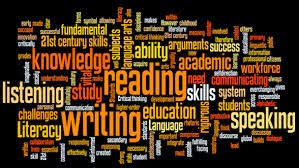What's literacy got to do with it?
14th April was Literacy Leaders day - as you were probably enjoying your holiday and blissfully unaware of Literacy Leaders day I thought it fine to visit the idea of literacy now.
When literacy is mentioned in a mathematical context the first thing that comes to mind is statistics & preparing students to write reports.
Google uncovered many kinds of literacy - digital, financial, cultural, emotional, geographical, environmental, academic, information .....
Looks like all teachers are teachers of literacy - this prompted 3 questions
- What is mathematical literacy?
- Why is it important?
- What do we need to know about effective literacy teaching?
The NZ curriculum says
Literacy is the ability to understand respond to, and use those forms of written language that are required by society and valued by individuals and communities (MOE, 2003)
Why has literacy become more important ?
1. Tasks in the senior school have changed. Once they were skills based and now they are context based
2. Expected responses to tasks has changed. Once students could simply find the answer or give single word/sentence responses, now they are expected to communicate their thinking and in the case of statistics write reports.
Being able to communicate ideas has become as essential as fluency with the language & symbols.
It is important that we find ways to encourage reading & writing while maintaining fluency of language & symbols.
How can we encourage natural reading & writing in our classroom ?
Here are 5 tried & true strategies
 1. Exit Slips - maybe overused but still offer a quick opportunity for students to communicate in writing with you. An exit slip could be a sticky note, a card, a google form, twitter and be about what they learned, how they found the lesson, a question they have for tomorrow.
1. Exit Slips - maybe overused but still offer a quick opportunity for students to communicate in writing with you. An exit slip could be a sticky note, a card, a google form, twitter and be about what they learned, how they found the lesson, a question they have for tomorrow.
2. How much emphasis do we put on ensuring students understand the mathematical meaning of common words.
The word RULE springs to mind. After spending some time using the word rule to describe the equation of a line, I then asked a student what a rule meant to her ... her response "something my mother says I have to do"
 The Frayer model is one I like, especially the non examples section which encourages students to think more deeply about a concept or word
The Frayer model is one I like, especially the non examples section which encourages students to think more deeply about a concept or word
This template could be adapted to include an illustration or maybe a section for what the word means in terms of their own experience.
3. Writing Frames in statistics help build structural fluency in report writing as well as developing vocabulary. Reduce the scaffolding as students develop confidence.
4. Foldables made with 2 A4 sheets of paper offer an alternative to writing in an exercise book or writing online
they also make a great reference tool
5. Age old games like bingo build fluency with language and symbols.
Use for number facts, algebra expressions, vocab, quadratic expansions ...
Another Ten Ways Literacy can promote a deeper understanding of maths
For more information try:
Ideas for Leading literacy from Literacy Online







Comments
Post a Comment